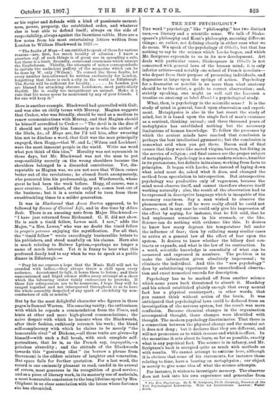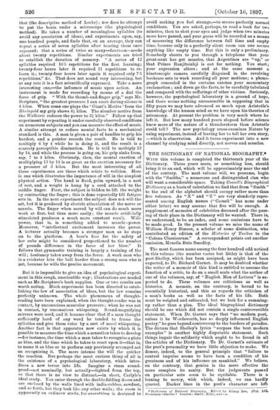THE NEW PSYCHOLOGY.*
THE word "psychology," like "philosophy," has two distinct uses,—a literary and a scientific sense. We talk of Shake- speare's philosophy and Kant's philosophy, meaning different things ; or, rather, not defining clearly in either case what we do mean. We speak of the psychology of Othello, but that has nothing to say to the science which Locke began, and which Mr. Scripture expounds to us in its new development. Art deals with particular cases; Shakespeare in Othello is not concerned with general laws of the human mind; it is only inferior artists—and notably one school of French novelists— who depart from their purpose of presenting individuals, and dogmatise at large upon the springs of action. Psychology for a dramatist or novelist is no more than what anatomy should be to the artist, a guide to correct observation ; and, strictly speaking, one might as well call the Lakcoon a treatise on anatomy as label Hamlet a psychological study.
What, then, is psychology in the scientific sense ? It is the study of mind in general, based upon observation and experi- ment. Metaphysics is also in the last resort the study of mind, but it is based upon the single fact of man's existence as a sentient, thinking animal ; and three thousand years of metaphysics has established nothing but the necessary limitations of human knowledge. To follow the processes by which the acutest minds have reached that conclusion is perhaps the best intellectual gymnastic; but the conclusion is somewhat arid when you get there. Bacon said of final causes that they were like sacred virgins, barren, but fitting in the service of religion ; and final causes are the proper subject of metaphysics. Psychology is a more modern science, humbler in its pretensions, but definite in its aims; working from facts to principles. It began with Locke, who instead of laying down what mind must do, asked what it does, and changed the method from speculation to introspection. But introspective psychology was productive only of vagueness, because the mind must observe itself, and cannot therefore observe itself working naturally ; also, the result of the observation had to be expressed in descriptive language which is incapable of the necessary exactness. Say a man wished to observe the phenomenon of fear. If he were really afraid he could not observe; and in any ease he could only give his impression of the effect by saying, for instance, that he felt cold, that he had unpleasant sensations in his stomach, or the like. Science can do nothing with evidence like this. It desires to know how many degrees his temperature fell under the influence of fear; then by collating many similar cases to arrive at a general law of the effect of fear upon the system. It desires to know whether the biliary duct con- tracts or expands, and what is the law of its contraction. In a word, scientific knowledge is essentially of what can be measured and expressed in numbers. The problem is to make the information given absolutely impersonal ; to eliminate the individual. And this the "new psychology" does by substituting experiment for unmethodised observa- tion and exact numerical records for description.
Psychology has to be marked off from another science which some years back threatened to absorb it. Mandaley and his school established plainly enough that every mental fact has a physical counterpart ; in other words, that you cannot think without action of the brain. It was anticipated that psychological laws could be deduced from an investigation of the nervous system, but the result was mere confusion. Because chemical changes in the organisation accompanied thought, those changes were identified with thought. The modern psychology discriminates. That there is a connection between the physical change and the mental act it does not deny ; but it declares that they are different, and will not pronounce as to which is cause and which is effect. In the meantime it sets about to learn, so far as possible, exactly what is any psychical fact. The science is in infancy, and Mr. Scripture's book is occupied quite as much with methods as with results. We cannot attempt to csiticise here, although it is obvious that some of his statements, for instance those relating to time, have a bearing on metaphysics ; our object is merely to give some idea of what the science attempts.
For instance, it wishes to investigate memory. The observer does not look into his own experience and generalise from
• The New Pevehology. By E. W. Scripture, Ph.D. (Leipzig), Director of the Yale Psychological Laboratory. With 1.24 illustrations. London: Walter Bcott.
that (the descriptive method of Locke) ; nor does he attempt to put the brain under a microscope (the physiological method). He takes a number of meaningless syllables (to avoid any association of ideas), and experiments upon, say, one hundred people, and finds that, on an average, they can repeat a series of seven syllables after hearing them once repeated; that a series of twice so many—fourteen—needs about twenty repetitions. Similar experiments are tried to establish the duration of memory. " A series of 12 syllables required 16.5 repetitions for the first learning; twenty-four hours later it required 11 repetitions to re- learn it ; twenty-four hours later again it required only 7.5 repetitions," dm That does not sound very interesting, but at any rate it is a fact scientifically expressed. Take a more interesting one,—the influence of music upon action. An instrument is made for recording by means of a dial the force of grip. "With the thumb-and-finger grip," says Mr. Scripture, "the greatest pressure I can exert during silence is 4 kilos. When some one plays the 'Giant's Motive 'from the Bheingold my grip shows 44 kilos. The slumber motive from the Walkiirie reduces the power to 31 kilos." Follow up that experiment by repeating it under carefully observed conditions on numerous subjects and you can measure the effect of music. A similar attempt to reduce mental facts to a mechanical standard is this. A man is given a pair of handles to grip his hardest, and a pointer records the result. He is told to multiply 6 by 4 while he is doing it, and the result is a scarcely perceptible diminution. He is told to multiply 13 by 14, and while the process is going on, his grip sinks from, say, 7 to 4 kilos. Obviously, then, the mental exertion of multiplying 13 by 14 is as great as the exertion necessary for a pressure of 3 kilos. But the most interesting of all these experiments are those which relate to volition. Here is one which illustrates the importance of will in the simplest physical action. The hand is fixed, palm upward, in a sort of rest, and a weight is hung by a cord attached to the middle finger. First, the subject is bidden to lift the weight by contracting the finger ; this is done repeatedly till fatigue sets in. In the next experiment the subject does not will the act, but it is produced by electric stimulation of the nerve or muscle. The finger when moved by will can do much more work at first, but tires more easily ; the muscle artificially stimulated produces a much more constant result. Will- power, that is, is something added to muscle - power. Moreover, "intellectual excitement increases the power. A lecturer actually becomes a stronger man as he steps on to the platform. A bear's fear for the safety of her cubs might be considered proportioned to the number of pounds difference in the force of her blow." It follows that gymnastic training is largely a training of the will ; hesitancy takes away from the force. A weak man who is a cricketer hits the ball harder than a strong man who is
because he wills the precise movement.
But it is impossible to give an idea of psychological experi- ment in this rough, unscientific way; illustrations are needed such as Mr. Scripture's book supplies. One or two results are worth noting. Much experiment has been directed to estab- lishing the law of association of ideas, but the law remains perfectly unknown. The whole phenomena of thought- reading have been explained, when the thought-reader was in contact, by unconscious muscular pressure ; when he was not in contact, by unconscious whispering. Sound-magnifying mirrors were used, and it became clear that if a man thought sufficiently hard of any word he tended to frame the syllables and give them voice by a sort of nasal whispering. Another fact is that apparatus now exists by which it is possible to measure the time which a sensation takes to develop —for instance, the time which a man takes to recognise a plate as blue, and the time which he takes to react upon it—that is, to name it as blue or to perform any previously arranged act on recognising it. The more intense the will the quicker the reaction. But perhaps the most curious thing of all is the existence of a psychological laboratory, which intro- duces a new terror into life. Imagine a room sound- proof—not nominally, but actually—lighted from the top, so that there is no view to distract,—in short, Carlyle's ideal study. You enter through the double-folding doors and are enclosed by the walls lined with india-rubber, sawdust, and so forth, but they look like any other walls ; the room is apparently
an ordinary study, for everwthine is desiened to avoid making you feel strange,—to secure perfectly normal conditions. You are asked, perhaps, to read a book for two minutes, then to shut your eyes and judge when two minutes more have passed, and your guess will be recorded as a means of measuring the difference between full time and empty time, because only in a perfectly silent room can one secure anything like empty time. But this is only a preliminary. Somebody shouts to you through a telephone that your great-aunt has got measles, that Argentines are "up," or that Prince Ranjitsinhji is out for nothing. You start; your expression alters ; and at the same moment a kinetoseopic camera carefully disguised in the revolving bookcase sets to work recording all your motions; a phono- graph concealed in the curtains catches your momentary exclamation ; and down go the facts, to be carefully tabulated and compared with the sufferings of other victims. Seriously, however, the psychological laboratory is a ground of hope, and there seems nothing unreasonable in supposing that in fifty years we may have advanced as much upon Aristotle's knowledge of the human mind as we have upon his theories of astronomy. At present the problem is very much where he left it. But how many hundred years elapsed before science knew more of the nature of a thunderstorm than Aristotle could tell P The new psychology cross-examines Nature by using experiment, instead of leaving her to tell her own story, —which is observation. And it turns experiment into a new channel by studying mind directly, not nerves and muscles.







































 Previous page
Previous page